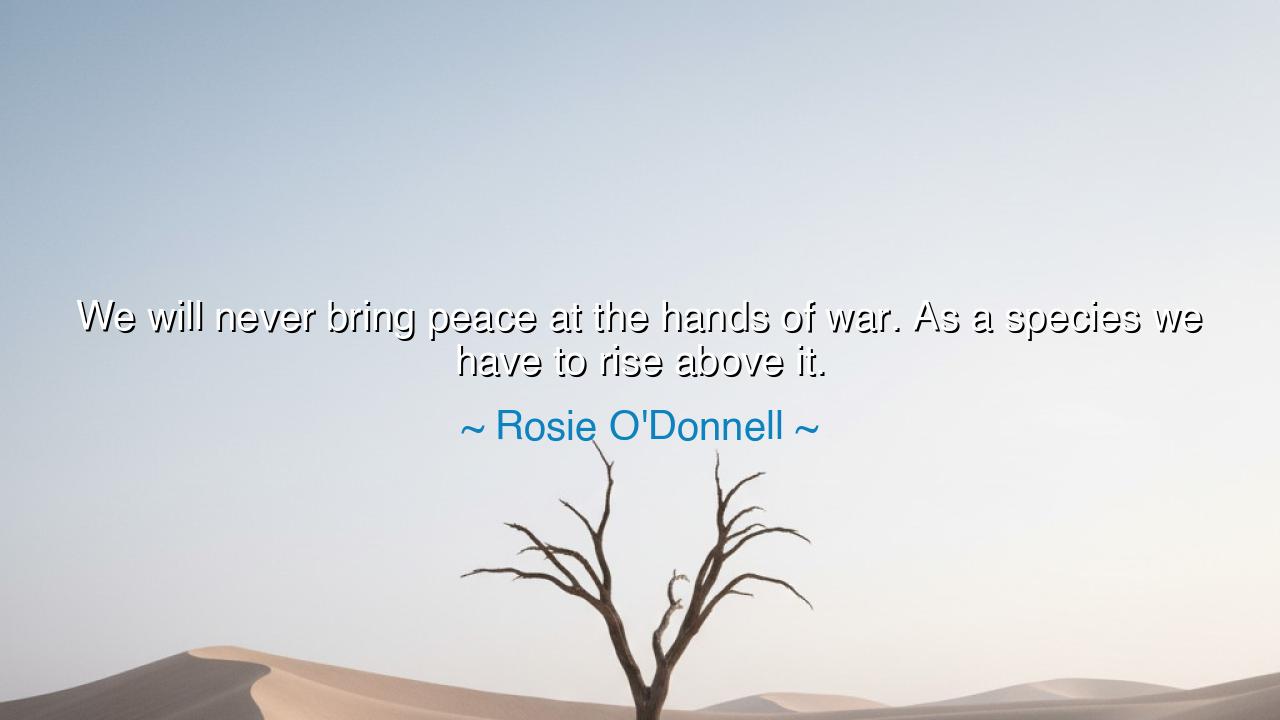
We will never bring peace at the hands of war. As a species we






Hear the cry of Rosie O’Donnell, who spoke not from idle pondering but from the bitter witness of human folly: “We will never bring peace at the hands of war. As a species we have to rise above it.” These words are both lament and command, echoing with the wisdom of generations who have seen that though battles may conquer lands, they cannot conquer the human spirit. For peace is not the child of violence; it is the harvest of restraint, forgiveness, and courage greater than that which wields the sword.
For what is war but the breaking of bonds, the sundering of trust, the unraveling of what humanity has labored to weave? Nations have often claimed that war would lead to a better tomorrow, yet time has proven the opposite. Each victory carved by blood leaves behind scars, bitterness, and seeds of future conflict. True peace cannot be imposed by force; it must be chosen by hearts, freely and fully. O’Donnell’s words call us to recognize that war, though loud and swift, cannot create what only patience and reconciliation can bring.
Consider the fate of Carthage. Rome declared that only through its utter destruction could peace be secured. And so, after fire and salt were laid upon the city, Carthage was no more. Yet did Rome find eternal peace? No—wars raged on, rebellions rose, and hatred simmered. Destruction begot not harmony, but only the hunger for more conquest. In contrast, when Japan and Germany were rebuilt after the Second World War, through cooperation rather than annihilation, they became strong allies, proving that to rise above war is the truest path to lasting unity.
Rosie O’Donnell speaks also of our duty as a species, not just as nations or tribes. For if mankind forever clings to the cycle of vengeance, we risk extinguishing ourselves. The weapons we wield now are far more terrible than those of our ancestors. Where once war scarred a valley or a city, now it can threaten the earth itself. To “rise above” is not a luxury—it is survival. We must awaken to the truth that our common humanity is greater than our divisions.
But hear this: to forsake war does not mean to embrace weakness. On the contrary, it requires the mightiest courage. It is easy to lash out, to strike when struck. Harder is the path of holding one’s anger, of choosing dialogue over destruction, of building bridges when the easier path is to burn them. This is the higher calling of our age—to become warriors of reconciliation, soldiers of peace.
O children of tomorrow, take this lesson into your lives: in your homes, in your communities, in your nations, remember that you cannot heal wounds by inflicting new ones. Strive to listen before you condemn, to forgive before you avenge, to seek understanding where others sow hatred. In your smallest quarrels, practice this art, for the soul that cannot make peace with a neighbor cannot hope to make peace among nations.
Thus the words of Rosie O’Donnell shine as a torch for our generation: war is a shadow, peace the light. We must not be deceived into thinking that violence can birth harmony. Instead, let us rise above, each of us, and lift our species toward the greater destiny of unity. For only then shall peace endure—not as the silence of fear, but as the song of a healed and hopeful world.






UGUser Google
Rosie O'Donnell’s statement that we must rise above war to achieve peace is powerful, but also difficult to implement in the real world. In a society where power is often gained through conflict, can we truly expect to overcome war as a means to achieve peace? What does ‘rising above it’ look like in practice? Is it about diplomacy, or something deeper—like a shift in how we value human life and cooperation?
GDGold D.dragon
This quote by Rosie O'Donnell challenges the idea that war can lead to peace, which is something I’ve always struggled to understand. War is inherently destructive, so how could it create anything lasting like peace? But how do we actually ‘rise above it’? Can nations move past their history of war and aggression, or do we still have deep-seated beliefs about conflict that prevent us from embracing other, nonviolent solutions?
TLTHuyen Thanh Le
I completely agree with Rosie O'Donnell’s point that peace cannot come through war. But how do we rise above it as a species? What concrete steps can we take to stop resorting to violence as a solution to conflict? Is it about cultural transformation, better education, or more empathetic leadership? How do we shift global thinking from conflict to cooperation, and what would it take to make this a reality?
Pphamlong
Rosie O'Donnell’s quote really makes me think about how contradictory it seems to try and bring peace through violence. We often hear about ‘just wars’ or wars for peace, but can true peace ever be achieved through conflict? Is it possible to rise above violence and find a path to lasting peace, or does history show us that peace often requires struggle and sacrifice, even if not in the form of war?